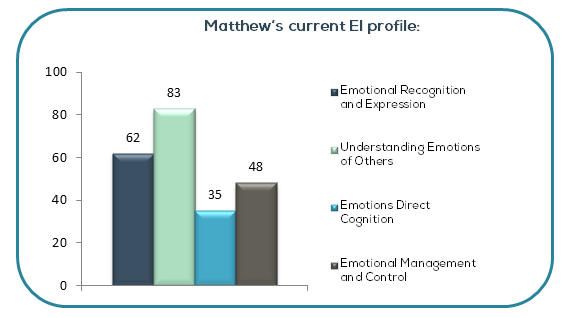Case study
Using emotional intelligence data to better understand your students
Matthew* has just completed Year 10 at school and is hoping to achieve high grades in his final years at high school in order to be offered a place in a Science degree at University. This year Matthew has completed the self-report version of the Adolescent Swinburne University Emotional Intelligence Test.
Read on to see how Matthews’s teachers are using the EI data to inform their decisions on how best to help Matthew achieve his goals over the coming years.
Emotional Recognition and Expression:
Matthew sits slightly above average in this domain, demonstrating that he has good awareness of his emotions and has a range of skills he can implement in order to effectively communicate these to others. Matthew can further develop his abilities in this domain by expanding his emotional vocabulary and consciously practising authentic expression of emotions when communication with others.
Emotional Reasoning:
Matthew shows here that he has developed some abilities to use emotional information in order to solve problems and make decisions, but tends to prefer using facts or details about the task at hand. Given his goal to excel in the domain of science, this problem solving style is likely to suit him moving forward in his studies in the science domain. In group settings, Matthew’s teachers may encourage him to communicate decisions in a way that are sensitive to others’ feelings.
Understanding Emotions of Others:
Scoring at the 83rd percentile for UEO, Matthew’s teachers identify this aspect of his EI as one of his relative strengths. This score indicates a capacity to effectively engage others, work collaboratively and seek help when required. In dealing with Matthew in class environments, teachers may be mindful that he is likely to perform well in group settings and is a good candidate to assume leadership responsibilities due to his empathic abilities related to this domain. His capacity to build strong relationships with peers and teachers will make seeking social support a constructive coping mechanism that Matthew can easily implement in the coming years when the need arises.
Emotional Management and Control:
Matthew’s EMC is right in the average for students of his age. While there isn’t anything to suggest his teachers should be concerned about this aspect of his EI abilities they have identified this as an opportunity for development for Matthew. Given his goal of achieving high grades is likely to induce some stress at times, working on his ability to effectively transition between a range of emotions, experiencing positive more often and not getting ‘stuck’ in negative emotions will be of benefit to him persevering in times of stress. This is likely to contribute to Matthew achieving his goal by helping him to remain optimistic and effectively cope with stress. His teachers may help Matthew to identify emotions that sometimes cause him trouble and use a range of Aristotle resources and activities that will help him to practice and plan how he will deal with these emotions as they arise.
*Matthew is a fictional student, created to demonstrate how EI data can be utilised.
